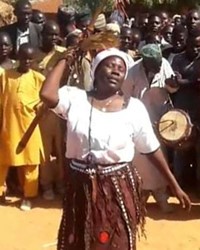Karekare, Jalalum in Nigeria

Photo Source:
Musaddam Idrissa Musa - Wikimedia
Creative Commons
|
Send Joshua Project a map of this people group.
|
| People Name: | Karekare, Jalalum |
| Country: | Nigeria |
| 10/40 Window: | Yes |
| Population: | 439,000 |
| World Population: | 439,000 |
| Primary Language: | Karekare |
| Primary Religion: | Islam |
| Christian Adherents: | 6.02 % |
| Evangelicals: | 3.02 % |
| Scripture: | New Testament |
| Ministry Resources: | No |
| Jesus Film: | Yes |
| Audio Recordings: | Yes |
| People Cluster: | Chadic |
| Affinity Bloc: | Sub-Saharan Peoples |
| Progress Level: |
|
Introduction / History
The Karekare are a Muslim, agricultural people who live in northeastern Nigeria near the Niger border. The people would rather call themselves "Karai-Karai". They speak their own language of Karekare. Some Bible books have been translated into the Karekare language. The JESUS Film is also available in Karekare. Unfortunately, many of the Karekare are unable to write and read so the good news will have to be presented to them in oral and visual forms. Many of the Karekare also speak Hausa.
Where Are they Located?
They are indigenous to Yobe and Bauchi States of northeastern Nigeria. The paramount ruler of the Karai-Karai is Mai Tikau, HRH Muhammadu ibn Abubakar Shuwa. His court is sited at Nangere, near Potiskum in Yobe State.
What Are Their Lives Like?
The Karai-Karai share similarities in culture with the Kanuri, Bade, Bole as well as Hausa/Fulani. Islam is prevalent but Karai-Karai have more Christians than any other indigenous tribes in Yobe State. The Karekare live in rural villages surrounded by the land they farm. The main occupations of the Karekare are agriculture and animal husbandry. The Karekare grow yams, beans, melons, millet, maize, and vegetables. Peanuts, kola nuts, and palm oil are important cash crops, which they use for buying things they cannot make for themselves such as cell phones and appliances. They raise cattle and goats for their meat, milk and hides. Chickens provide eggs and meat. Village elders settle legal disputes and deal with outsiders.
Most people groups in rural Nigeria like the Karai-karai enjoy music, story telling and dance as a form of entertainment and communication. These art forms are very meaningful in rural Nigeria. Those who want to take the gospel to the Karai-Karai people would do well to use these art forms when presenting the gospel.
What Are Their Beliefs?
Most Karai-karai people are Sunni, the largest branch of Islam. They believe that the One, Supreme God, Allah, revealed through his prophet, Mohammed, and taught mankind how to live a righteous life through the Koran and the Hadith. To live a righteous life, you must utter the Shahada (a statement of faith), pray five times a day facing Mecca, fast from sunup to sundown during the month of Ramadan, give alms to the poor, and make a pilgrimage to Mecca if you have the means. Muslims are prohibited from drinking alcohol, eating pork, gambling, stealing, slandering, and making idols. They gather for corporate prayer on Friday afternoons at a mosque, their place of worship.
The two main holidays for Sunni Muslims are Eid al Fitr, the breaking of the monthly fast and Eid al Adha, the celebration of Abraham's willingness to sacrifice his son to Allah.
In most of the Muslim world, peoples like the Karai-karai depend on the spirit world for their daily needs since they regard Allah as too distant. Allah may determine their eternal salvation, but the spirits determine how well we live in our daily lives. For that reason, they must appease the spirits. The often use charms and amulets to help them deal with spiritual forces. A small fraction of the Karekare is Christian.
What Are Their Needs?
The Karai-Karai people need adequate rain for their crops and their livestock so they can live lives free of want and poverty. They need modern medical care and good schools that will help the next generation to thrive in a rapidly changing world. Solar panels can bring electricity for charging cell phones and running appliances.
The Karai-Karai people need to hear and understand the message of Isa or Jesus Christ. He alone can forgive their sins and get them right with the one, true God.
Prayer Points
Pray for God's kingdom to come and His will to be done among the Karai-Karai people.
Pray for a movement of Karai-Karai households to study the Bible and accept the blessings of Christ.
Pray for a spiritual hunger that will drive the Karai-Karai people to the arms of Jesus.
Pray for workers who are filled with the fruit and the power of the Holy Spirit to go to the Karai-karai people.
Pray the Lord moves Nigerian Christians to engage the Karekare with the gospel.